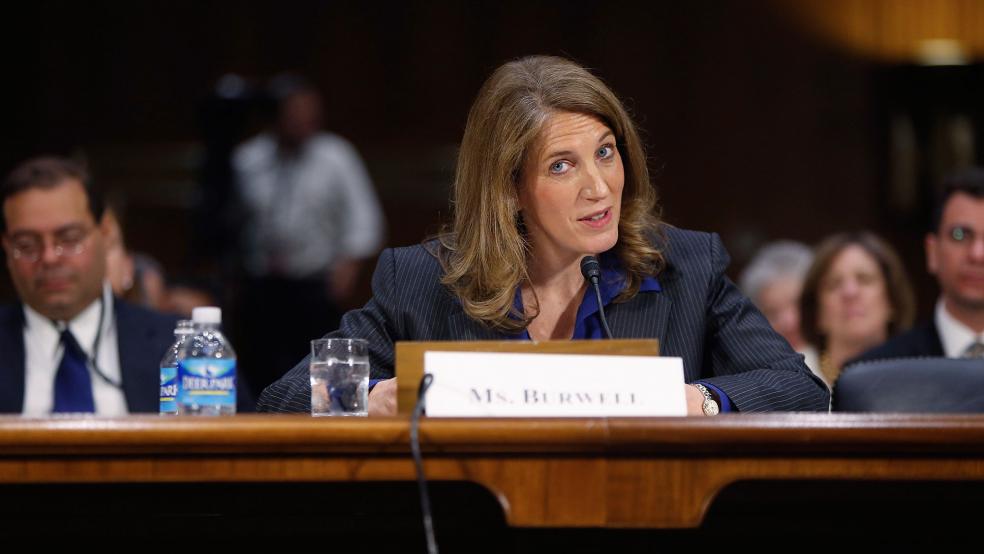Sylvia Burwell, the new head of the Department of Health and Human Services, has managed to navigate her first 100 days in office without eliciting much attention from the media – or lawmakers. While that’s a victory of sorts for the top official of such a complex federal agency, Burwell still faces plenty of challenges.
As Obamacare’s second open enrollment period approaches, millions of people have gained insurance through the health exchanges as well as through Medicaid expansion. Burwell needs to ensure this enrollment period goes far more smoothly than last year’s did when technical glitches and cancelled insurance policies were all too often the norm.
Related: HHS Chief Burwell Confirmed with Strong GOP Support
Burwell, 49, is approaching the task with confidence. This week she delivered a speech at the Brookings Institution in Washington, D.C., and touted the law as a success so far, citing a 25 percent reduction rate for uninsured adults.
“When you consider the law through the lens of affordability, access and quality, the evidence points to a clear conclusion. The Affordable Care Act is working – and families, businesses, and taxpayers are better off as a result,” she said.
Her gig goes far beyond Obamacare, however. Burwell manages the entire HHS department, which has a 2015 budget of more than $1 trillion and more than 75,000 employees nationwide. She oversees the massive Medicare and Medicaid programs, the Food and Drug Administration, the National Institutes of Health and the Centers for Disease Control and Prevention, among other lesser-known agencies. Suffice it to say, this is an especially busy year.
Related: Obamacare Could Go Back to the Supreme Court
Here are the five biggest challenges the HHS chief has in the coming months.
- Obamacare Open Enrollment: Year Two
The department is preparing for November 15, when the federal and state marketplaces open for the second open enrollment period. HHS is expecting the number of insurers in the marketplace to increase by 25 percent next year, and the Congressional Budget Office has estimated enrollment will be around 13 million signups this year. Making sure the exchanges in every state as well as the federal marketplace run smoothly is a top priority, especially after last year. - HealthCare.Gov and Other Troubled Exchanges
Recent reports from federal watchdogs have highlighted a spate of security problems with HealthCare.gov. Both the HHS IG and the Government Accountability Office have detected weaknesses that could potentially leave consumer data vulnerable to hackers. During a press briefing with reporters on Wednesday, Burwell declined to confirm that the website would be fully fixed and ready by the launch date.
She did say HHS is “taking every step we can … to continue on our process and be ready for open enrollment,” adding, “We are checking off outstanding items on last year's to-do list, cleaning up the back-end functionality and adding functionality for renewing and enrolling in coverage.” Meanwhile, a handful of states are dealing with problems with their own websites, and Oregon and Nevada have even decided to join the federal exchange this year. - States and Medicaid
Since the Supreme Court ruled states could opt out of the Affordable Care Act’s Medicaid Expansion, 23 states have decided not to expand their programs. That leaves millions of people who would have otherwise received coverage without health insurance. HHS has worked with some states like Arkansas on an alternative Medicaid expansion program. Yet others, like Florida and Texas, which have GOP governors, have remained adamant about not working with the federal government to expand their programs. Their primary concern is cost; they say their states’ cash-strapped budgets can’t handle the expenses down the road.
Still, HHS will likely continue pressing these states to change their minds. CMS announced on Wednesday that the ACA is expected to result in $5.7 billion in savings in uncompensated hospital costs this year alone; states that have expanded Medicaid have reaped about 74 percent of these savings. That’s because hospitals are reimbursed by Medicaid for patients they would otherwise have to treat for free.
- Political Infighting Over Obamacare
Lawmakers have been relatively quiet these days about the president’s health care law, with calls for full repeal abating. Depending on how the midterm elections go, that could all change. Sen. Rob Portman (R-OH) told reporters last week at a Christian Science Monitor breakfast that if the GOP wins a Senate majority, one of its first orders of business would be to call a vote to repeal Obamacare.
Even if this happens, it would almost certainly be strictly symbolic, since President Obama isn’t about to sign a bill repealing the law. Still, the political climate next year could present serious challenges for Burwell and her team, especially when the employer mandate takes effect. - Potentially Crippling Legal Challenges
Legal experts are predicting Obamacare may wind up back at the Supreme Court again soon. Right now, there are four cases centering on the legality of the law’s federal subsidies. Plaintiffs argue that the law only intended for federal subsidies for enrollees who sign up on the state exchanges, and that subsidies going to anyone enrolled through the federal marketplace are invalid. If the Supreme Court does decide to hear the case, it could result in bad news for the Obama administration: An unfavorable ruling would thwart the health care law and leave millions without affordable coverage.
Top Reads from The Fiscal Times:





